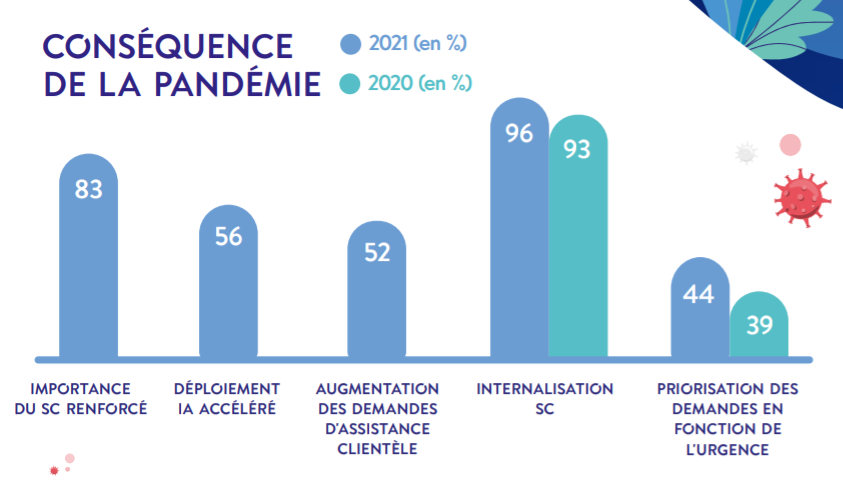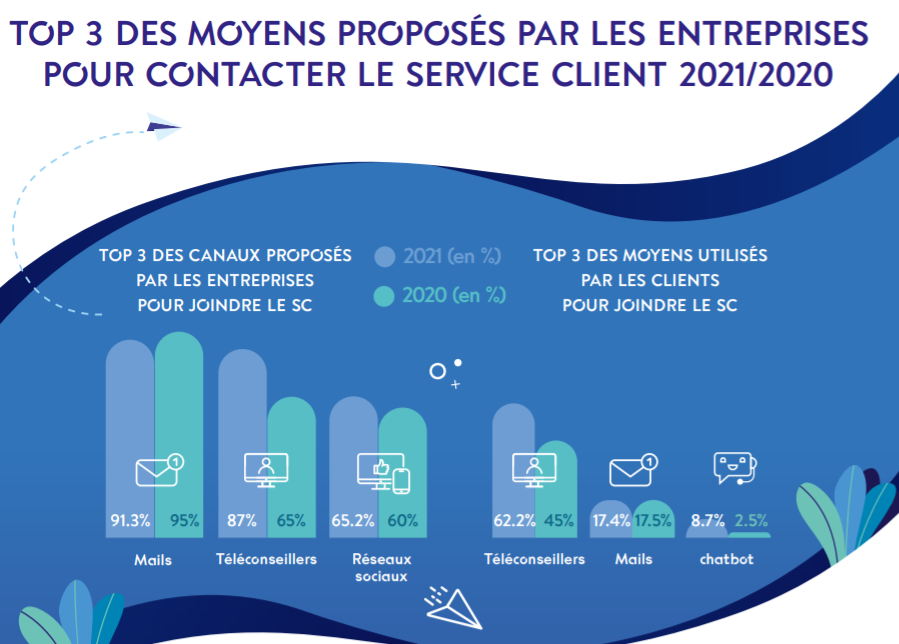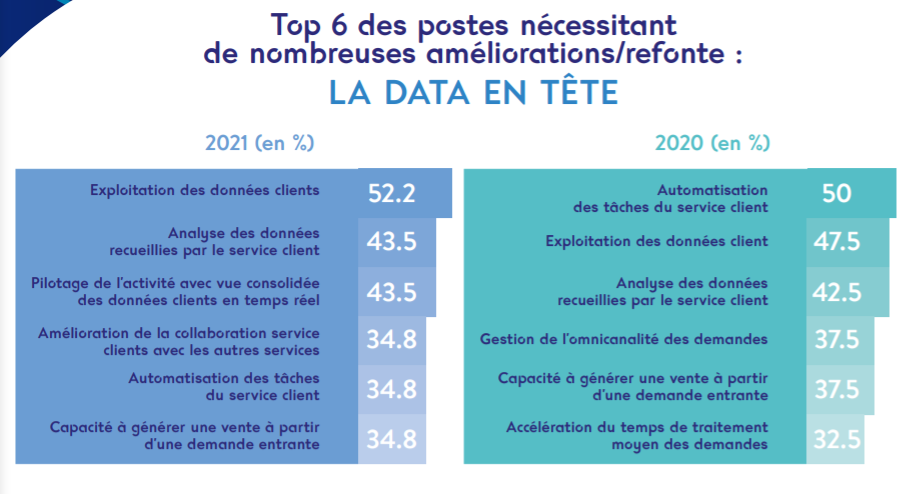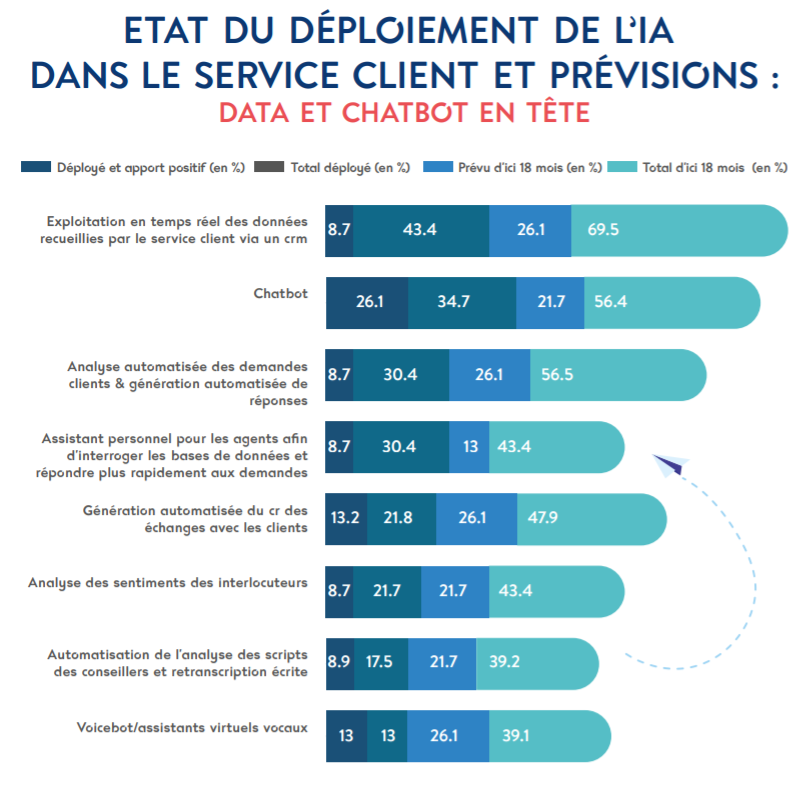
In its second edition of the barometer to better understand the impact of AI and digitalization on customer service, Axys Consultants surveyed players in this sector to identify their organization and the place these technologies take in customer support. More than a hundred customer service managers were interviewed from April 26 to May 21, 2010, focusing on several areas: integration and benefits of new technologies, areas for improvement, influence of COVID-19, etc. ActuIA offers you a review of this survey on customer service in the era of AI and digitalization.
The impact of the pandemic on AI and digitalization on customer service
For this second edition of its survey, Axys Consultants partly focused its study on the consequences of the COVID-19 pandemic. As a result, 83% of companies believe that the pandemic has increased the importance of customer service and 56% that it has accelerated the deployment of AI. Below is a diagram highlighting several aspects of digitalization in customer service:

Throughout the survey, all of the results are offered in comparison to the year 2020. Overall, the top three ways companies use to reach customer service remain unchanged from 2020. However, there is a sharp increase in the number of callers (87% compared to 65% in 2020): this is due to the fact that it has been quicker to increase staffing levels than to implement technological tools to deal with the sudden increase in customer complaints.

We notice that chatbots are under-exploited: they are not present among the top 3 channels offered by companies to reach customer service, even though they are the third most used by customers. It has increased compared to 2020, as have telephone advisors. Omnichannel is also on the rise, with half as many companies seeing customers using a single channel for a single request (19% in 2021 versus only 9% in 2020).
Managing and improving customer service, integrating artificial intelligence: data in the lead
For almost all companies (96%), improving customer service is a priority. As a day-to-day priority, the figure drops to 78%, but is a marked improvement on 2020 (63%). While in 2020, automating customer service tasks was the most important aspect for half of the companies, this has changed as only one in three companies are now focusing on it. The use of customer data is now at the top of the list of concerns for organisations to improve their customer service (52%).

In terms of the state of AI deployment in corporate customer service, the timely exploitation of data collected by a company’s customer service as well as chatbots are the priorities of companies for the next 18 months. From the chart below, we can see that at least 55% of companies plan to deploy chatbots, data mining or automated customer inquiry analysis in the next 18 months.

The significant impacts of AI deployment on customer service
Compared to 2020, all satisfaction rates have increased. But consider that in 2020, many companies didn’t have enough insight to estimate the impacts of AI yet. The top 5 significant improvements seen by companies:
- 64%: increase in agent productivity (not asked in 2020)
- 55%: increased resolution of requests at first contact (vs. 13% in 2020)
- 45%: improved prioritization of work (vs. 3%)
- 45%: agents more satisfied with their working conditions (vs. 10%)
- 45%: improved manager performance (vs. 7%)
In relation to AI, the expectations of customer service players are even higher than in 2020:
- 96%: better use of customer data (vs. 93% in 2020)
- 91%: redirect demand to the right service with greater reliability (vs. 90%)
- 87%: Respond to customers more quickly (up from 83%)
- 87%: Improve agent productivity (not asked in 2020)
- 87%: Reduce customer processing costs through automation (vs. 87.5%)
Finally, the survey looked at the barriers to AI implementation. 63% of companies say that a request handled by a human will always yield better results than if it is handled by a chatbot. A figure that has increased compared to 2020 (58%). Other hindrances mentioned include:
- 83%: Don’t redesign processes before implementing AI (not asked in 2020)
- 78%: not implementing a more agile and collaborative organization before implementing AI (not asked in 2020)
- 78%: corporate culture -employees not sufficiently aware of AI- (versus 65% in 2020)
- 61%: insufficient support from top management (vs. 62.5%)
- 61%: AI too costly to develop (vs. 77.5%)
- 57%: insufficient support from customer service managers (vs. 60%)
- 52%: AI too complex to implement (vs. 60%)
Translated from L’intelligence artificielle dans le service client des entreprises : l’enquête d’Axys Consultants









